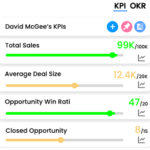Key Performance Indicators Examples

Throughput
Throughput is a metric that measures the rate at which a system completes a specific task or process. It is used to measure the efficiency of a system and to identify areas where the system could be improved.
The formula for Throughput is:
Throughput = (Number of Tasks Completed / Time Taken to Complete the Tasks)
It is calculated by dividing the number of tasks completed by the time taken to complete those tasks. The unit of throughput is typically tasks per unit of time, such as tasks per hour or tasks per day.
For example, if a factory completes 100 units in 8 hours, the throughput would be 12.5 units per hour.
Throughput is an important metric for companies that have a significant number of tasks or processes, because it allows them to identify trends in efficiency and to make informed decisions about process improvement and resource allocation.
It’s also important to track the Throughput by different segments, such as by different teams, products, or customers, in order to identify where the problem is and take action to increase the Throughput. Additionally, it’s important to track the Throughput over time and compare it against industry benchmarks and historical data to identify if the rate is increasing or decreasing, and take the appropriate actions accordingly.
Measure what matters for your business with KPIs
Track business performance with real time key metrics against targets in one place without the need for multiple dashboards or reports
